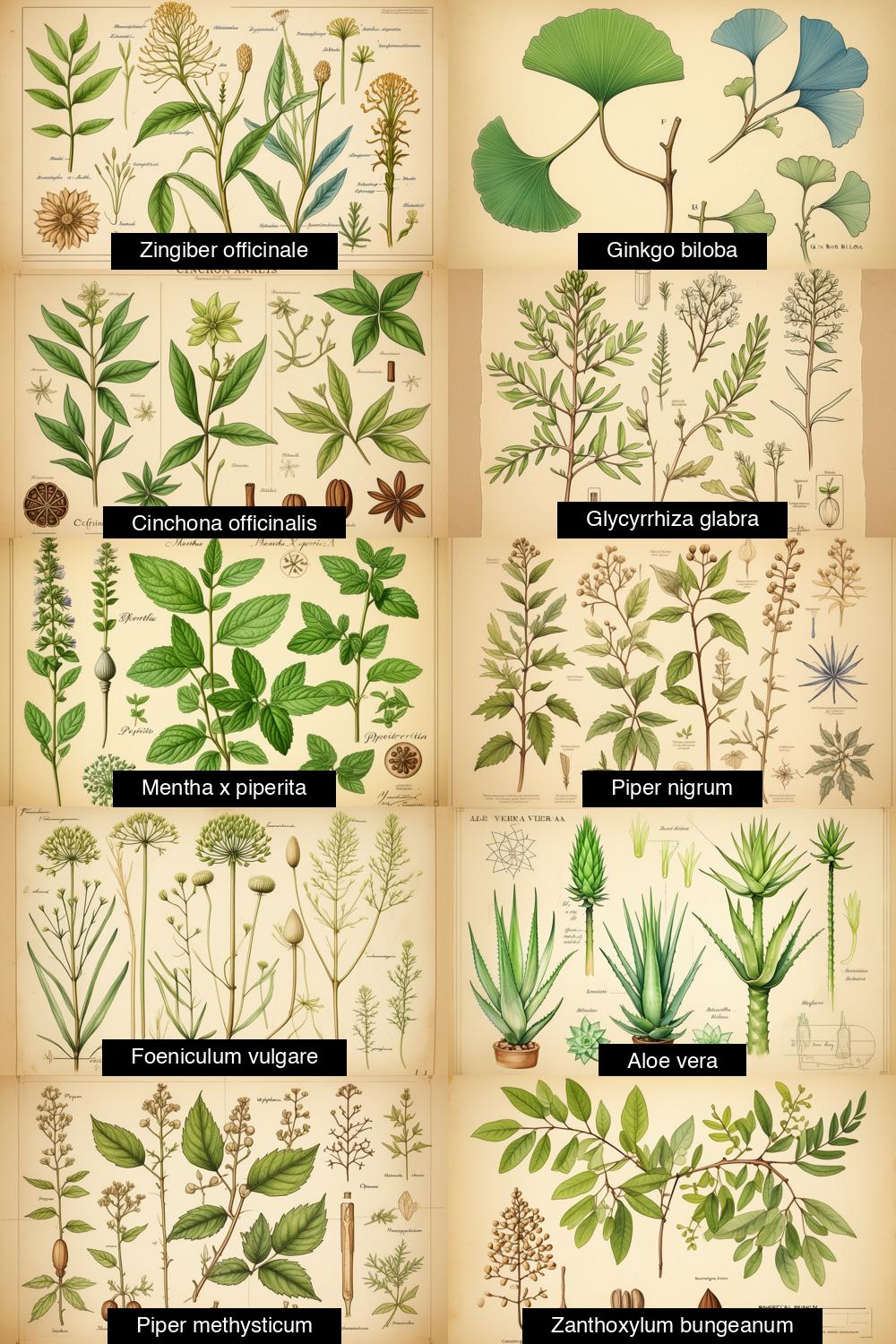By Leen Randell
Updated: Oct 1, 2024
Nausea: Causes, Medicinal Herbs and Herbal Preparations

Nausea is an unpleasant and distressing sensation of queasiness or a feeling of needing to vomit, often caused by various factors such as motion sickness, food poisoning, pregnancy, medications, or underlying medical conditions.
If left untreated, nausea can lead to dehydration, electrolyte imbalances, and weakened immune systems. Fortunately, herbal remedies like ginger, peppermint, and chamomile can provide relief from nausea.
Medicinal teas, tinctures, and supplements can be effective in alleviating symptoms, but it's essential to consult with a healthcare professional before using herbal remedies, especially for pregnant or breastfeeding individuals, and to follow recommended dosages to avoid adverse reactions.
This article explains in detail what are the causes of nausea, what medicinal herbs to use to relieve this problem and how to prepare these herbs to get the best results.
What are the main causes of nausea?
The main causes of nausea are multifaceted and can be attributed to various physiological and psychological factors.
Gastrointestinal issues such as gastroparesis, inflammatory bowel disease, and food poisoning can trigger nausea due to the abnormal movement of stomach contents or inflammation in the digestive tract. Hormonal fluctuations during pregnancy, menstruation, and menopause can also lead to nausea as a result of prostaglandin and estrogen levels. Central nervous system disorders such as migraines, inner ear problems, and neurological conditions like multiple sclerosis can cause nausea due to abnormal brain activity.
Additionally, psychological factors like anxiety, depression, and post-traumatic stress disorder (PTSD) can contribute to nausea through the brain's stress response and altered gut function.
- Motion Sickness: Motion sickness is a common cause of nausea due to conflicting signals between the senses of balance, vision, and sensation, often triggered by traveling in a vehicle, boat, or other moving object.
- Food Poisoning: Food poisoning is a leading cause of nausea due to the presence of bacteria, viruses, or other pathogens in contaminated food or water, which can cause inflammation and irritation in the stomach and intestines.
- Hormonal Changes: Hormonal changes, particularly during pregnancy, menstruation, or menopause, can cause nausea due to fluctuations in estrogen and progesterone levels, leading to stomach upset and vomiting.
- Anxiety and Stress: Anxiety and stress can trigger nausea through the release of stress hormones such as adrenaline and cortisol, which can slow digestion and cause stomach upset.
- Medication Side Effects: Medication side effects, particularly those associated with chemotherapy, antidepressants, and painkillers, can cause nausea due to the toxic effects of the medication on the stomach and nervous system.
- Infections: Infections, such as the flu, strep throat, and sinus infections, can cause nausea due to the presence of inflammatory chemicals and toxins in the body, which can irritate the stomach and cause vomiting.
- Dehydration: Dehydration can cause nausea due to a lack of fluids and electrolytes in the body, leading to an imbalance in the body's chemistry and causing stomach upset and vomiting.
- Digestive Disorders: Digestive disorders, such as irritable bowel syndrome (IBS), gastroparesis, and inflammatory bowel disease (IBD), can cause nausea due to chronic inflammation and irritation in the stomach and intestines.
- Underlying Medical Conditions: Underlying medical conditions, such as liver disease, kidney disease, and neurological disorders, can cause nausea due to the buildup of toxins and waste products in the body, leading to stomach upset and vomiting.
What are the primary medicinal plants used for nausea?
The main medicinal herbs used for nausea are Zingiber officinale, Ginkgo biloba, Cinchona officinalis, Glycyrrhiza glabra, Mentha x piperita, Piper nigrum, Foeniculum vulgare, Aloe vera, Piper methysticum, Zanthoxylum bungeanum.
Zingiber officinale, commonly known as ginger, contains compounds like gingerol and shogaol which have anti-inflammatory properties that help alleviate nausea. Cinchona officinalis contains quinine which acts on the central nervous system to reduce nausea and vomiting. Glycyrrhiza glabra, known as licorice root, has anti-inflammatory properties that help reduce stomach inflammation and alleviate nausea, while Ginkgo biloba may help alleviate nausea due to its ability to improve blood flow.
Foeniculum vulgare, or fennel, and Mentha x piperita, or peppermint, contain carminative properties that help ease digestion and alleviate nausea.

- Zingiber officinale: Zingiber officinale contains compounds like gingerols and shogaols, which have anti-inflammatory and anticholinergic properties, helping to alleviate nausea by reducing inflammation in the stomach and intestines, and blocking the action of acetylcholine, a neurotransmitter that can stimulate nausea.
- Ginkgo biloba: Ginkgo biloba contains flavonoids and terpenoids that may help alleviate nausea by improving blood flow to the stomach, reducing inflammation, and modulating the neurotransmitter serotonin, which plays a role in nausea.
- Cinchona officinalis: Cinchona officinalis contains compounds like quinine, which has been traditionally used to treat nausea, particularly in cases of malaria, by its ability to reduce the severity of symptoms and alleviate nausea.
- Glycyrrhiza glabra: Glycyrrhiza glabra contains compounds like glycyrrhizin, which has anti-inflammatory and antioxidant properties, helping to alleviate nausea by reducing inflammation in the stomach and intestines, and protecting against oxidative stress.
- Mentha x piperita: Mentha x piperita contains menthol, which may help alleviate nausea by its ability to relax the smooth muscles in the stomach, reducing nausea and vomiting.
- Piper nigrum: Piper nigrum contains piperine, which may help alleviate nausea by its ability to inhibit the action of acetylcholine, a neurotransmitter that can stimulate nausea, and by reducing inflammation in the stomach and intestines.
- Foeniculum vulgare: Foeniculum vulgare contains compounds like fenchone and anethole, which may help alleviate nausea by their ability to relax the smooth muscles in the stomach, reducing nausea and vomiting.
- Aloe vera: Aloe vera contains compounds like aloin, which may help alleviate nausea by reducing inflammation in the stomach and intestines, and protecting against oxidative stress.
- Piper methysticum: Piper methysticum contains compounds like kavalactones, which may help alleviate nausea by their ability to reduce anxiety and stress, which are common triggers for nausea.
- Zanthoxylum bungeanum: Zanthoxylum bungeanum contains compounds like eugenol, which may help alleviate nausea by its ability to relax the smooth muscles in the stomach, reducing nausea and vomiting.
What are the main herbal preparations used for nausea?
The main herbal preparations used for nausea are Tincture, Decoction, Capsule, Suppository, Lozenges, Pills, Gel, Cream, Ointment, Liquid Extract.
Tincture, a concentrated liquid extract, is effective in nausea relief due to its bioavailability and quick absorption into the bloodstream. Decoction, a liquid extract made by boiling herbs, is often used for nausea caused by stomach issues as it helps to soothe the digestive tract. Capsules and Pills, containing powdered herbs, are commonly used for nausea caused by gastrointestinal issues as they allow for precise dosing and controlled release of active compounds.
Additionally, Suppositories, Lozenges, Gel, Cream, Ointment, and Liquid Extract preparations are also used to alleviate nausea by applying the herbal extract directly to the affected area or through topical application.

- Tincture: A tincture of plants like Zingiber officinale, often used to treat nausea, works by being quickly absorbed into the bloodstream, which helps to rapidly alleviate nausea symptoms.
- Decoction: A decoction of plants like Ginger (Zingiber officinale) helps with nausea due to its ability to release compounds like gingerols and shogaols, which have anti-inflammatory properties and can help to alleviate nausea symptoms.
- Capsule: A capsule containing a powdered extract of plants like Peppermint (Mentha piperita) helps with nausea because the menthol in the peppermint can help to relax the muscles in the stomach and alleviate nausea symptoms.
- Suppository: A suppository made from plants like Atractylis gummifera helps with nausea by releasing compounds that can help to alleviate nausea symptoms in the lower part of the gastrointestinal tract.
- Lozenges: Lozenges containing a extract of plants like Ginger (Zingiber officinale) help with nausea by releasing compounds like gingerols and shogaols, which can help to alleviate nausea symptoms in the mouth and throat.
- Pills: Pills containing a powdered extract of plants like Ginger (Zingiber officinale) help with nausea due to the ability of gingerols and shogaols to alleviate nausea symptoms by reducing inflammation in the stomach and intestines.
- Gel: A gel made from plants like Aloe (Aloe barbadensis) helps with nausea by releasing compounds that can help to soothe the stomach and alleviate nausea symptoms.
- Cream: A cream made from plants like Ginger (Zingiber officinale) helps with nausea by releasing compounds like gingerols and shogaols, which can help to alleviate nausea symptoms by reducing inflammation in the stomach and intestines.
- Ointment: An ointment made from plants like Ginger (Zingiber officinale) helps with nausea by releasing compounds like gingerols and shogaols, which can help to alleviate nausea symptoms by reducing inflammation in the stomach and intestines.
- Liquid Extract: A liquid extract of plants like Peppermint (Mentha piperita) helps with nausea due to the ability of menthol in the peppermint to relax the muscles in the stomach and alleviate nausea symptoms.